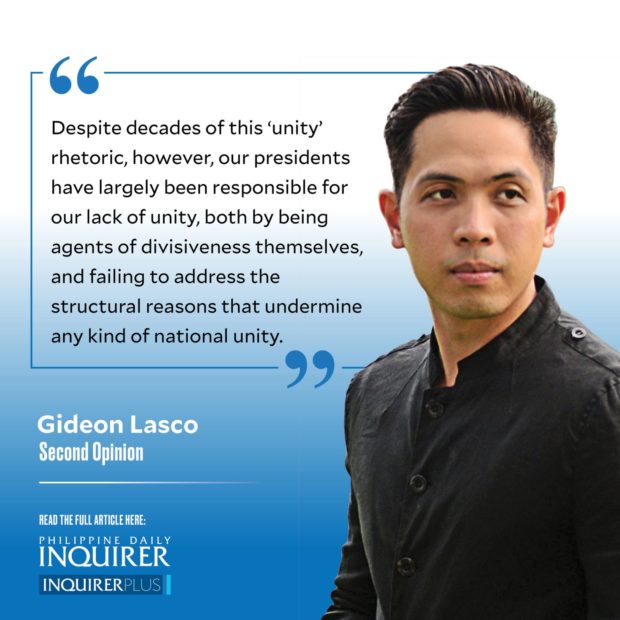No unity without social justice
If there’s one thing that’s constant in Philippine politics, it is that presidential candidates have routinely called for unity, no matter how ambiguous they are about what such “unity” means; how divisive they themselves turned out to be; and no matter how counterproductive they are to truly achieving unity in our country.
For instance, President Duterte, in his miting de avance on May 7, 2016, declared that “it will be one nation only, one Filipino nation,” prefacing such declaration by saying that “you cannot build a country by killing people.” His predecessor, Benigno Aquino III, likewise summoned the idea of unity, specifically toward his “tuwid na daan”; in his first New Year message, he wrote: “If we remain united, we can do more to achieve our goals. I hope Filipinos will continue to look after each other and practice the bayanihan spirit in following the straight path.”
For her part, Gloria Arroyo, in her inaugural speech after Edsa Dos, declared “the unity, the Filipino’s sense of history, and his unshakeable faith in the Almighty … will continue to guide and inspire us.” In the same speech, she concluded: “Join me, therefore, as we begin to tear down the walls that divide. Let us build an edifice of peace, progress, and economic stability.”
If we go further back, to give just one more example, we have Ferdinand Marcos, who, months before martial law, stated: “we must be a united nation, a people fused together as one great force,” exhorting his constituents to be united against “the gathering forces of ideological dissent” as well as “the problems that face us in the socio-economic field and the problems of government which have long plagued our leaders and administrators.”
Despite decades of this “unity” rhetoric, however, our presidents have largely been responsible for our lack of unity, both by being agents of divisiveness themselves, and failing to address the structural reasons that undermine any kind of national unity.
Consider the case of Mr. Duterte, who, despite his early declarations of “unity” and “healing” only took weeks into his presidency to show his divisive, vindictive character—vilifying Leila de Lima (who, lest we forget, is still in jail), and instigating the “Dilawan vs. DDS” narrative. Significantly, he has used regional and local identity politics to his advantage—for instance, invoking “Bisaya culture” or “Cebuano subculture” against “Imperial Manila,” effectively reinforcing divisions in our nation.
Beyond fomenting divisiveness, Mr. Duterte’s governance has undermined the preconditions for unity, all of which fall under the rubric of social justice.
First and foremost, accountability: When people do not trust the fairness of our justice system, they turn to a toxic culture of “palakasan” which by nature involves being partisan as far as local and national politics are concerned, thereby eroding the very foundations of unity. Under Mr. Duterte’s regime, we see impunity instead, with the President excusing himself from being held accountable for his drug war, the Pharmally deal, among many others.
Second, equity: When people see that other categories of people (e.g., those from the cities, those with a high educational background) have an advantage over them, they will be resentful toward those groups of people, losing sight of the failed leadership that has actually led to such inequity. Alas, Mr. Duterte’s governance has been characterized by inequity, including his drug war that has mainly targeted the poor. Ditto with the COVID-19 response where the burden has been borne by poor Filipinos the most.
Finally, inclusivity: When people see that the government is favoring the president’s allies, and those from his hometown, their conviction will grow that the government is a matter of “winners” and “losers,” again preventing them from feeling solidarity with others. This, too, is glaringly evident in the current administration with Mr. Duterte appointing so many people from Davao at the expense of a truly representative government.
All of the above—accountability, equity, and inclusivity—are likewise missing with many of the presidential candidates today, even as they intone “unity” as some kind of mantra, bereft of philosophy or platform.
Amid such blatant emptiness and hypocrisy, our response must be to vote for those who understand the need for social justice if we are to truly and meaningfully unite the nation.
—————
glasco@inquirer.com.ph





















